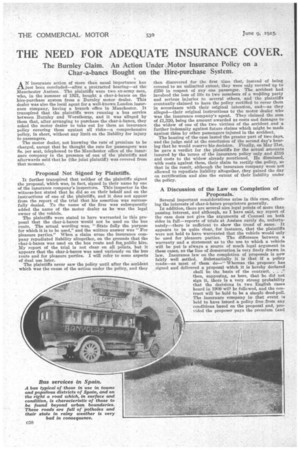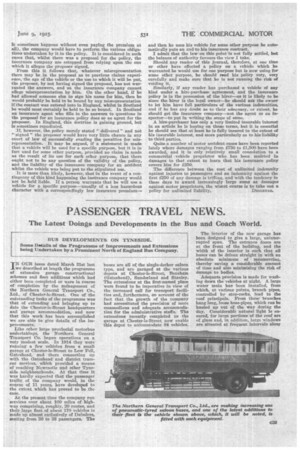THE NEED FOR ADEQUATE INSURANCE COVER.
Page 22

Page 23

If you've noticed an error in this article please click here to report it so we can fix it.
The Burnley Claim. An Action Under Motor Insurance Policy on a Char-a-bancs Bought on the Hire-purchase System.
AN insurance action of more than usual importance has just been concluded—after a protracted hearing—at the Manchester Assizes. The plaintiffs were two ex-army men, who, in the summer of 1921, bought a char-a-bancs an the hire-purchase system from a Burnley motor dealer. This dealer was also the local agent for a well-known London insurance company, having a branch office in Manchester. It transpired that the plaintiffs were running a bus service between Burnley and Worsthorne, and it was alleged by them that, after arranging to purchase the char-a-bancs, they asked the motor dealer to take out for them an insurance policy covering them against all risks—a comprehensive policy, in short, without any limit on the liability for injury to passengers.
The motor dealer, not knowing the rate of premium to be charged, except that he thought the rate for passengers was Ss. per seat, telephoned to the Manchester office of the insurance company in the presence of one of the plaintiffs and afterwards said that he (the joint plaintiff) was covered from that moment.
Proposal Not Signed by Plaintiffs.
It further transpired that neither of the plaintiffs signed the proposal, which was, in fact, signed in their name by one of the insurance company's inspectors. This inspector in the witness-box stated that he did so on their behalf and on the instructions of one of the plaintiffs, and it does not appear from the report of the trial that his assertion was successfully denied. To the name of the firm was subsequently added the name of the motor dealer as he was the legal owner of the vehicle.
The plaintiffs were stated to have warranted in this proposal that the char-a-banes would not be used on the bus route. The actual wording was, "State fully the purpose for which it is to be used," and the written answer was " For pleasure parties." When a claim arose the insurance company repudiated liability altogether, on the grounds that the char-h-bancs was used on the bus route and for ,public hire. My report of the trial is not clear on all points, but it appears that the char-a-bancs was used variously on the bus route and for pleasure parties. I will refer to some aspects of dual use later.
The plaintiffs never saw the policy until after the accident which was the cause of the action under the policy, and they then discovered for the first time that, instead of being covered to an unlimited extent, they were only covered up to 1250 in respect of any one passenger. The accident had involved the loss of life to two members of a romping party and serious injuries to several others, and the plaintiffs eventually claimed to have the policy rectified to cover them in accordance with their original intention, and—as they alleged—their original instructions to the motor dealer who was the insurance company's agent. They claimed the sum of £1,320, being the amount awarded as costs and damages to the widow of one of the two victims of the accident and a further indemnity against future claims which might be made against them by other passengers injured in the accident.
The hearing of the case lasted the greater part of two days, and the judge said at the conclusion of the second day's hearing that he would reserve his decision. Finally, on May 21st, he gave a verdict for the plaintiffs for the actual amounts insured by the terms of the insurance policy only and 1316 and costs to the widow already mentioned. He dismissed, with costs against them, their claim to rectify the policy, so that in the result, although the insurance company were not allowed to repudiate liability altogether, they gained the day on rectification and also the extent of their liability under the policy.
A Discussion of the Law on Completion of Proposals.
Several important considerations arise in this case, affecting the interests of char-a-banes proprietors generally.
In addition, there are several nice legal points of more than passing interest, and although, as I have said, my report of the ease does not give the arguments of Counsel on both sides in full—reports of trials at Assizes rarely do, unfortunately—there is sufficient to show the trend of same. It appears to be quite clear, for instance, that the plaintiffs were not held to have warranted that the vehicle would only be used for pleasure parties. The difference between a warranty and a statement as to the use to which a vehicle will be put is always a source of much legal argument in these cases, as the line of demarcation is very finely drawn in law. Insurance law on the completion of proposals is now fairly well settled. Substantially it is that if a policy reads—as most of them do—" Whereas the proposer has signed and delivered a proposal which it is hereby declared shall be the basis of the contract. . . ." then, supposing, as here, that he did not sign it, there is a very strong probability that the decisions in two English cases heard in 1909 will be followed, and the contract will be held to be a simple deed-poll. The insurance company in that event is held to have issued a policy free from any conditions based on the proposal and, provided the proposer pays the premium (and it sometimes happens without even paying the premium at all), the company would have to perform the varions obligations undertaken by it in the policy. It is considered in such cases that, whilst there was a proposal for the policy, the insurance company are estopped from relying upon the one which it alleges the proposer signed.
From this it fellows that, whatever misrepresentation there may be in the proposal as to previous claims experience, the age of the vehicle or the use to which it will be put, the proposer, by not having signed the proposal, has not warranted the answers, and so the insurance company cannot allege misrepresentation by him. On the other hand, if he had allowed someone else to sign his name for him, then he would probably be held to be bound by any misrepresentation if the contact was entered into in England, whilst in Scotland he would most certainly be held to be so bound. In Scotland an insurance agent who fills in the answers to questions in the proposal for an insurance policy does so as agent for the proposer. In England, this doctrine is gaining ground, but is sometimes repudiated.
If, however, the policy merely stated " delivered " and not " signed " the proposer would have very little chance in any court of law of successfully evading the penalties for misrepresentation. It may be argued, if a statement is made that a vehicle will be used for a specific purpose, but it is in fact used for some other purpose, provided no claim is made as the result of its use for such other purpose, that there ought not to be any question of the validity of the policy, and the liability of the insurance company for an accident whilst the vehicle was being put to the stipulated use. •
It is more than likely, however, that in the event of a contingency of this kind happening the insurance company would net be held liable. If a person warrants that he will use a• vehicle far a specific purpose—usually of a less hazardous character with a correspondingly low insurance premium— and then he uses his vehicle for some other purpose he automatically puts an end-to his insurance contract.
I admit that the law on this point is not fully settled, but the balance of authority favours the view I take.
Should any reader of this journal, therefore, at one time or other have effected a policy on a vehicle which he warranted he would use for one purpose but is now using for seine other purpose, he should read his policy very, very carefully and make sure that be is not running the risk of voiding it.
Similarly, if any reader has purchased a vehicle of any kind under a hire-purchase agreement, and the insurance policy is in the possession of the hirer—as it is likely to be since the hirer is the legal owner—he should ask the owner to let him have full particulars of the various indemnities, and if he has any doubt as to their adequacy, or extent, he should get the insurance company—not the agent or an inspector—to put in writing the scope of same.
A hire-purchaser hag only a very limited insurable interest in an article he is buying on those terms, but it is essential he should see that at least he is fully insured to the extent of his insurable interest, and more particularly as to his liability to third parties.
Quite a number of motor accident eases have been reported lately where damages ranging from £750 to £1,500 have been awarded, and it is only relatively small consolation to a commercial vehicle proprietor who has been mulcted in damages to that extent to learn that his insurance policy covers him for 1250.
The difference between the cost of unlimited indemnity against injuries to passengers and an indemnity against the first £250 of any damage is trifling, and with the tendency in these days to award increasingly large sums as damages against motor proprietors, the wisest course is to take out a
policy for unlimited liability. Dioemees.






























